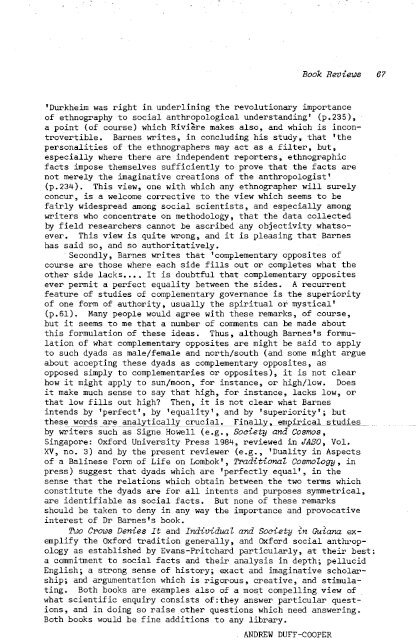Download searchable PDF of Volume 16 1985 - Institute of Social ...
Download searchable PDF of Volume 16 1985 - Institute of Social ...
Download searchable PDF of Volume 16 1985 - Institute of Social ...
Create successful ePaper yourself
Turn your PDF publications into a flip-book with our unique Google optimized e-Paper software.
Book Reviews 67<br />
'DurkhEdm was right in underlining the revolutionary importance<br />
<strong>of</strong> ethnography to social anthropological understanding' (p.235),<br />
a point (<strong>of</strong> course) which Riviere makes also, and which is incontrovertible.<br />
Barnes writes, in concluding his study, that 'the<br />
personalities <strong>of</strong> the ethnographers may act as a filter, but,<br />
especially where there are independent reporters, ethnographic<br />
facts impose themselves sufficiently to prove that the facts are<br />
not merely the imaginative creations <strong>of</strong> the anthropologist'<br />
(p.234}. This view, one with which any ethnographer will surely<br />
concur, is a welcome corrective to the view which seems to be<br />
fairly widespread among social scientists, and especially among<br />
writers who concentrate on methodology, that the data collected<br />
by field researchers cannot be ascribed any objectivity whatsoever.<br />
This view is quite wrong, and it is pleasing that Barnes<br />
has said so, and so authoritatively.<br />
Secondly, Barnes writes that 'complementary opposites <strong>of</strong><br />
course are those where each side fills out or completes what the<br />
other side lacks •••• It is doubtful that complementary opposites<br />
ever permit a perfect equality between the sides. A recurrent<br />
feature <strong>of</strong> studies <strong>of</strong> complementary governance is the superiority<br />
<strong>of</strong> one form <strong>of</strong> authority, usually the spiritual or mystical'<br />
(p.61). Many people would agree with these remarks, <strong>of</strong> course,<br />
but it seems to me that a number <strong>of</strong> comments can be made about<br />
this formulation <strong>of</strong> these ideas. Thus, although Barnes's formulation<br />
<strong>of</strong> what complementary opposites are might be said to apply<br />
to such dyads as male/female and north/south (and some might argue<br />
about accepting these dyads as complementary opposites, as<br />
opposed simply to complementaries or opposites), it is not clear<br />
how it might apply to sun/moon, for instance, or high/IOW. Does<br />
it make much sense to say that high, for instance, lacks low, or<br />
that low fills out high? Then, it is not clear what Barnes<br />
intends by 'perfect', by 'equality', and by 'superiority'; but<br />
these __ ~()l'~:::;~(:iT~_
















